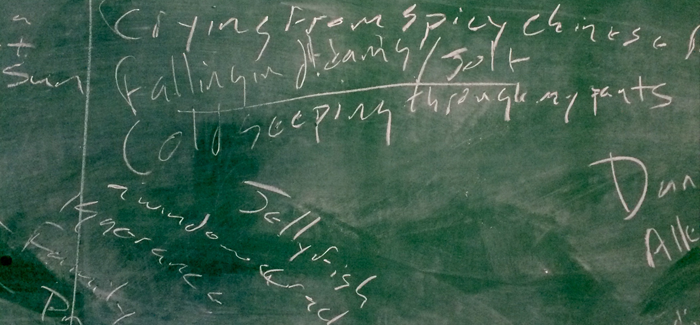
The chalkboard after class. (Photography by Minna Jaffery)
For a College student in her final undergraduate year, elective courses offer surprising risks—and rewards.
As a fourth-year in the College, I have grown a bit complacent. By now I know how to navigate the course selection websites and the multitudes of syllabi. I can analyze evaluations for courses and professors to find the information I need. And after three-plus years of work and planning, I am done with the requirements of the Core and my double major in English language and literature and Near Eastern languages and civilizations.
Finally, it is time for electives.
And suddenly I’m at a loss. Which department should I look at? What key words should I type in? What do I want? What do I need? Looking over my options for winter quarter, I decided to try a creative writing course. I had never taken one before—my English classes had all been focused on critical study more than creative exploration. The class I enrolled in was called Introduction to Creative Nonfiction Writing. Our instructor was David MacLean, an essayist and memoirist and a visiting faculty member. With little frame of reference for what to expect, I assumed our assignments would be similar to the papers I’d spent the rest of college writing. I was so wrong.
Creative nonfiction meant personal essays—lots of them. In MacLean’s class, we have written about everything from what it means to have a pet to the effects of a hunger strike on one’s spirituality. And we’ve done plenty of reading too. The syllabus contains memoirs, graphic novels, and anthologized essays. From Montaigne to Roxane Gay, the course traces the development of the personal essay from its origin in Greece, to the Enlightenment, to the present day. Learning about that history would give us the background, MacLean told us, to write our own. In a class of 12 students, all humanities majors, we grappled with what it meant to explore this personal side of ourselves. Some of my classmates had taken fiction-writing courses, but this was everyone’s first foray into our internal worlds.
Over the past nine weeks, the class has been demanding in ways that were new to me, asking us to be more vulnerable and less concerned about writing in perfect prose. It felt risky, and also liberating. Our shorter in-class writing assignments have been tremendously fun. In one we were asked to describe three things we’ve had smeared on our faces: among the examples people gave were face cream, makeup, and birthday cake icing. In another we wrote an internal monologue of an animal. I chose my dog, Taco, who glares at me when I eat chocolate that I can’t give to her.
The class isn’t a workshop per se, but we read the shorter pieces aloud in class. We generally don’t give any context first, launching into our assignments in whichever order we please. Then, as our abbreviated form of workshopping, the class and MacLean offer feedback: what worked, what didn’t, what connections were made or missed, and why. Not giving any context first means the essays have to stand on their own, but another benefit is that they come out sillier than they were perhaps intended—even the most serious essay sounds humorous when read in conjunction with a story about the plot of the worst movie you’ve ever seen. For me this takes some of the pressure off reading my inner ramblings out loud to the group.
Our homework assignments are far more challenging. The first essay MacLean asked us to write was about our names. I wrote about the Islamic and Pakistani heritage that mine carries and the common mispronunciations that get under my skin (it’s like “Minnesota,” but without the “-sota”; somehow, people always want to say “Meena”). Limiting myself to the assigned three pages was a challenge. How am I supposed to condense the only identifier I have known for 21 years into a mere three pages, double spaced with appropriate margins? It made me feel far more open—and a little exposed—than I had been in any writing assignment I’d done before. The essay was so intensely about me, not about a novel or author or critical theorist I was studying. The stakes are different when we are trying to articulate our lives and project outward what we are so used to internalizing.
Now, with only a couple of weeks left in the class, and one last quarter of electives to go, I am no longer complacent. I’m excited and curious and looking forward to the possibilities.
